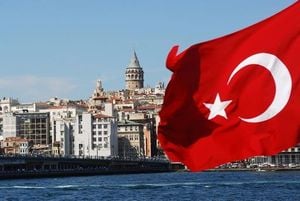A remarkable story of identity and heritage is making waves as an Arizona-born professor discovers an unexpected truth about his ancestry—thanks to modern DNA testing technology. John Portmann, an academic with a steady academic career, is now a proud holder of an Irish passport after his genealogical journey revealed a 100% Irish background. The twist? He claims this makes him one of the first individuals ever to gain Irish citizenship purely based on DNA test results.
Born in 1963, Portmann was placed in the care of the Sisters of Mercy in Phoenix, Arizona, shortly after his birth. Adopted by Walter and Carol Portmann, he grew up with their two biological children, knowing from an early age that he had been adopted. Yet, until recently, the identity of his biological parents remained a mystery, mostly due to Arizona's restrictive adoption laws. He had always assumed he might have Scandinavian roots, a notion fostered by those around him.
His journey took a pivotal turn in 2019 when his adoptive sister encouraged him to take a DNA test through an ancestry website. When he received the results showing he was 100% Irish, disbelief washed over him. "I thought it must be a mistake. I thought maybe my little vial got confused with someone else's," he told BBC NI. Shaken but curious, he sought the assistance of a Canadian expert, often referred to as a 'DNA detective.' This marked the beginning of his journey to uncover the true roots of his identity.
Portmann extensively communicated with his DNA detective, who helped him trace relationships within shared genetic data. She painstakingly analyzed his genetic matches, ultimately leading to substantial insights into his biological family. Through her work, it was discovered that his biological father, Thomas Fitzgerald, was a teacher from Dublin, and his mother, Térese Delahanty, hailed from County Kilkenny. This extensive ancestry investigation brought him closer to individuals he never thought he would meet.
Reflecting on this crucial moment in his life, Portmann felt profoundly thankful for the technological advancements that made it possible. "It was the DNA that revealed my past to me… DNA changed my life," he expressed, emphasizing the emotional weight of his newfound heritage. As he navigated the complexities of his past, he learned about the family he never knew existed—gaining insight into his father's life and his mother's secret struggles. He lamented that his mother probably carried shame throughout her life, hiding her child’s existence from her family.
After piecing together his heritage, Portmann encountered legal challenges in his quest for Irish citizenship. He took action in 2020 by filing a court case in Arizona to legally affirm that Thomas Fitzgerald and Térese Delahanty were indeed his biological parents. With significant DNA evidence, the court ruled in his favor, providing an official declaration of paternity.
Armed with this declaration, Portmann approached the Irish embassy in Washington D.C. But Irish authorities originally lacked guidance on such cases—specifically regarding the use of DNA as legal proof of citizenship. As he recounted, "Getting Ireland to accept me was difficult, because I didn’t have any papers at all because I was adopted. Ireland is not obliged to honor the rulings of other courts in other countries. The DNA evidence proved to be crucial."
In a breakthrough for fellow adoptees, the Irish Department of Foreign Affairs eventually agreed to consider the DNA results, which eventually led to his official recognition as an Irish citizen. Portmann pointed out that this case marks a historic precedent, as it may open new avenues for others seeking to confirm their heritage as well.
Finally armed with his passport, Portmann traveled to Ireland in October of the previous year, bringing him one step closer to the family ties he had long wished to explore. His newfound citizenship not only granted him the privilege of exploring his heritage but allowed him to affirm his gratitude toward Ireland for its support in recognizing his identity. "I want people to know how grateful I am to Ireland, because Ireland has been very generous towards me,” he stated proudly.
The story of John Portmann’s journey encapsulates how breakthroughs in DNA testing can change lives profoundly. Those interested in the merging of technology, personal lineage, and citizenship find inspiration in Portmann's life. His experience brings forward critical questions about identity in the modern world and the substantial role genetic testing plays as society increasingly embraces such technology.
As DNA testing continues to evolve, experts suggest it will empower more individuals like Portmann to claim their rightful identities, navigate complicated family dynamics, and even inspire legal reforms in citizenship eligibility. With open arms and horizons ahead, Portmann's encounter with his Irish roots illuminates a narrative about ancestry that resonates beyond borders—one that touches on the very essence of belonging and identity in contemporary history.



